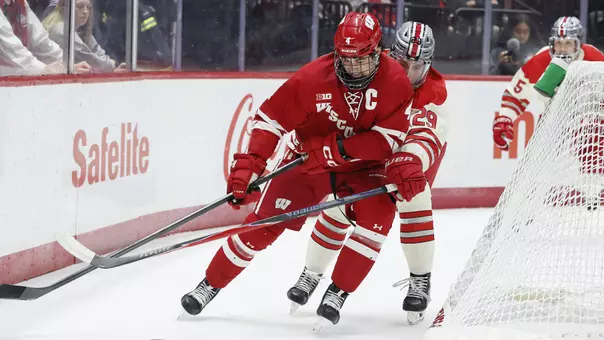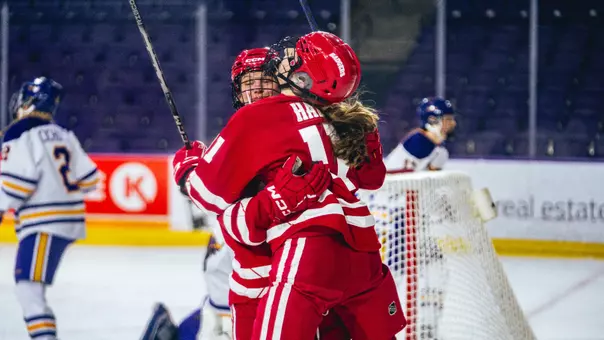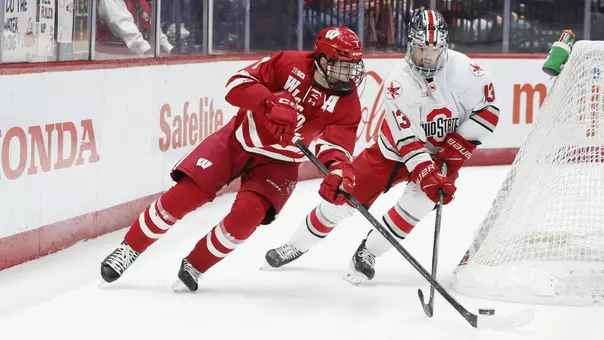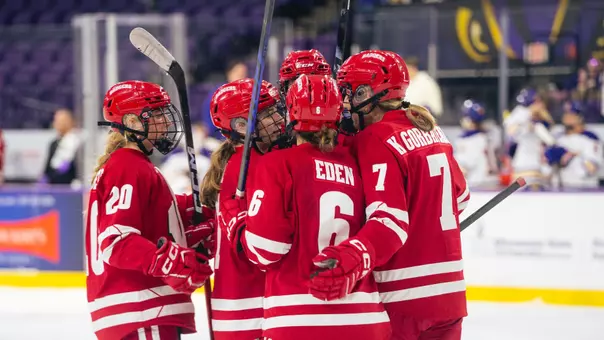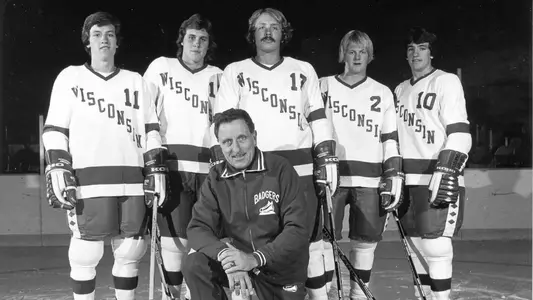
Baggot: Bob Johnson’s legacy lives on in family and hockey
November 24, 2021 | Men's Hockey, Women's Hockey, Andy Baggot
Exploring memories with Mark Johnson as Badgers host ‘Faceoff Against Cancer’
BY ANDY BAGGOT
UWBadgers.com Insider
MADISON, Wis. — The old-fashioned manila folder is nearly three inches thick and worn from decades of being filled beyond its reasonable capacity. The name on the label is scrawled in pencil and is haphazardly crooked, bringing a humble air to its iconic contents.
"BOB JOHNSON" is the entry on the tattered white ID sticker.
Inside the personal file for the legendary Wisconsin men's hockey coach are faded newspaper clippings from across North America, black and white photos both staged and impromptu, press releases on multi-hued stationary and personal notes both typed and hand-written.
There are announcements for civic events and speeches. There are photo copies of stories. There is a three-page resume. There are a couple of notable event programs.
One is from a celebration of life memorial service held at Bethel Lutheran Church in Madison on Dec. 2, 1991, six days after Johnson died from brain cancer.
The other is from the UW Athletic Hall of Fame induction ceremony that honored Johnson posthumously 10 months later. It's dated Sept. 18, 1992 and represents one of several prominent, endearing tributes to the man affectionately known as "The Hawk" or "Badger" Bob.
The file has made its way to an office on the third level of LaBahn Arena where his oldest son Mark, the Wisconsin women's hockey coach, has it in his lap. He's going through its contents for the first time, narrating as he randomly pulls items into view.
There's a copy of the resume that Johnson had on file, one that included the United States Army and Professional Baseball under the heading of Professional Experience: "He was drafted by the (Chicago) White Sox as a pitcher," Mark noted. "He played infield, but he was a pitcher, too. He had big hands. Threw a forkball. My mom (Martha) got pregnant so he had to quit."
There are a host of staged photos featuring Johnson with sons, Mark and Peter, assistant coaches Bill Howard, Mike Kemp, Bill Rothwell and Grant Standbrook, and various players from the 1970s such as Julian Baretta, Mike Eaves, Les Grauer, George Gwozdecky and Gary Enberg: "Bill Rothwell could sell ice to the Eskimos," Mark said. … "Bobby (Suter) and I used to work at Gary Engberg Sporting Goods. … "Stubby Grauer. He was a good player. He was my left winger for a while."
There's a picture of Bob chatting with one of his players in what looks like a cafeteria line: "That had to be pregame meal at the Regent (Apartments)," Mark declared. "That's where we had them. Back then we didn't have the nutritional stuff, so the guys that weren't dressing that night might have two or three steaks."
There's letter from Phil Mendel, a friend and neighbor of the Johnsons who doubled as the loquacious public address announcer for games at the Dane County Coliseum: "He was part of the culture here," Mark said. "His introductions were like artwork. He came up with words that nobody knew what they meant."
There's a program for "Roast The Hawk Barbecue and Barn Dance" from August of 1981, an event that defined Johnson's popularity with the masses given that there were more than 200 individual and corporate donors: "That's crazy," Mark said.

There's a random photo of Elroy Hirsch, who took over as Wisconsin athletic director three years after Bob Johnson was hired away from Colorado College to coach the Badgers in 1966. The two men were cut from the same bolt of cloth when it came to energy, enthusiasm and selling their products to the masses: "Totally," Mark said.
For more than an hour, Mark Johnson sat behind his desk and fed off the contents of the file, sharing stories, anecdotes and reactions before breaking things off to go to practice.
The project took place because Friday marks the 30-year anniversary of a great loss that has since become a great cause.
Bob Johnson was 60 when he died. He left behind an unmatched legacy that continues to have an impact at all levels of hockey in the U.S. and abroad.
Bob built the Wisconsin men's program into a national powerhouse, winning 367 games from 1966 to '82 and guiding it to NCAA titles in 1973, '77 and '81.
Bob watched Mark become an icon through his role on the American squad that won the Olympic gold medal in 1980. Mark led the "Miracle on Ice" team in scoring, including two goals in the landmark upset of the Soviet Union.
Bob moved on to the NHL in 1982 where he helped turn Calgary (1988) and Pittsburgh (1991, '92) into Stanley Cup champions.
Bob was executive director for USA Hockey from 1987 to '90, a brand that has since cultivated an elite international reputation in terms of player development for men, women and the disabled.
Bob was inducted in the international Hockey Hall of Fame, an honor that took place in 1992, expedited by his death.
Bob was renowned for a catch-phrase — "It's a Great Day for Hockey" — that's embraced on banners in rinks across North America. That includes LaBahn Arena, where the six-time NCAA champion women's program play to sellout crowds, and the Kohl Center, where the six-time NCAA men's titlists are headquartered and where Mark's retired No. 10 sweater hangs from the rafters.
The UW men's team will stage its annual "Faceoff Against Cancer" when Clarkson comes to Madison for a two-game non-conference series that begins at 7 p.m. Friday.
There will be 6,000 rally towels given away and a ceremonial puck drop prior to the game. Throughout the night, the Badgers will recognize the work of those fighting the disease, including survivors and first responders. Two events that raise money for local research at the UW Carbone Cancer Center and the American Family Children's Hospital — The Ride and Casting for Kids — will also be showcased.
Both Wisconsin coaches have profound links to Bob Johnson and the war on cancer. Mark, of course, played for his father at UW from 1976 to '79 and in three Canada Cups, including the one in 1991 when Bob was initially diagnosed. Meanwhile, men's coach Tony Granato was recruited to Madison by Johnson, was a member of that Johnson-coached Canada Cup squad in 1991 and has seen his father, Don Sr., and brother, Don Jr., fight the disease.
Granato remembers that day in Pittsburgh when he joined Chris Chelios and Gary Suter — fellow UW standouts and NHL veterans on that Canada Cup team — for a trip to the hospital to see Johnson.
"When we saw him, we realized the condition of his health and what he was dealing with," Granato said.
But Johnson was anything but withdrawn. Though unable to speak, he grabbed a pen and paper and diagrammed tactical sequences for an upcoming game with Sweden.
"I was overwhelmed by how sharp he was," Granato said, "and how important it was for him to let us know that, 'Hey, you've got a game tonight.'
"He was writing it down; not speaking. I don't remember if it was a forecheck or defensive zone coverage or what he was writing down on a piece of paper. The three of us looked at each other in complete amazement that he could put together his thoughts, worrying about us."
Granato, the fourth-all-time leading scorer in Wisconsin men's history, was asked which of Johnson's coaching traits he'd most like to have.
"Any of them," Granato said. "To me, he was the person I looked up to as the mentor for what a coach should be. He was who I would like to be most like."
Granato, who spent 13 season as an NHL head coach in Colorado and an assistant in Pittsburgh and Detroit, said Mark shares a profile with his father right down to how he hunches his shoulders.
"The spirit, the energy, the positive vibes are very similar," Granato said of his friend. "When you talk to Mark and you ask about his team or his players, just the excitement he has when he's praising the game or the players he's coaching."
Mark, now 64, has had extraordinary success following in his father's footsteps. Since taking over the UW women's program in 2002, he's become the winningest coach in NCAA history in addition to producing national championship clubs in 2006, '07, '09, '11, '19 and '21.
"The only thing that I get sad about is that he missed out on the women's hockey," Mark said of his father. "He would have loved to have been part of that."
In a small, poignant way, he is. Diamonds from Bob's 1991 Stanley Cup championship ring were used in an engagement setting for one of his grandsons. Scott McConnell, who played college hockey at Denver, married Jessie Vetter, the two-time U.S. Olympian and three-time NCAA championship goaltender for the Badgers. Meanwhile, Mark's son Patrick, a former UW men's player, said diamonds from a gift that Bob gave to Martha were part of the engagement setting he gave to his wife Hannah. Patrick and Hannah are both first responders with the Madison fire and police departments, respectively.
How would Mark describe his dad to one of his current players?
"The first thing I'd say is you would have loved playing for him," Mark said. "He had a lot of energy. Very positive. An excellent teacher. If your coach has those traits, you're going to have a fun time playing and you'll be successful."
Mark was asked for his favorite trait of his father. He said Bob was a hoarder who never threw away notes or newspaper clippings. When the Johnsons lived at 5 Flad Circle in Madison, multiple newspapers were delivered every day, including the Minneapolis Star-Tribune.
"I remember how he would teach himself and learn from other people," Mark recalled. "His detail stuff was pretty phenomenal."
Teaching was Bob's passion. He taught physical education and history while coaching baseball, football and hockey at two Minneapolis high schools in the mid-1950s. That continued at Colorado College, where Johnson worked from 1963 to '66.
"He was a teacher before he was a coach," Mark said. "Back then, that's how guys his age were. A lot of them taught in high school. When he went to Colorado Springs he was the assistant football coach, the head baseball coach and the head hockey coach. Where do you see that today?"
Mark said his own ability to teach the game is a byproduct of his time playing at the college, international and NHL levels. Earlier this month, his unbeaten and top-ranked women's team had to settle for a scoreless draw with Bemidji State despite a 56-14 advantage in shots on goal.
"What can we do to be better tomorrow?" Johnson asked rhetorically. "I'm lucky because I've played at all these different levels. I can put myself in (senior winger) Daryl Watts' skates and reflect on what she's thinking."
Mark is not big into memorabilia — he famously had his red, white and blue gloves from the 1980 Olympics available at a garage sale until an astute neighbor intervened — but he does have his father's last pair of skates and the gloves Bob wore for his last Canada Cup go-round in 1991.
Mark also has memories.
"You reflect on things and it makes you smile," he said.
Like summertime hockey camps in Madison and Colorado.
Like the weekend routines when his father coached the Badgers. The family would watch games Friday and Saturday nights at the Coliseum, then return Sunday for pick-up games.
Like Bob riding an old-fashioned two-wheel bike — the handlebars skew — through the streets of Calgary to practice at the old Saddledome.
"Can you imagine him in Calgary Flames sweats biking to the rink?" Mark asked with a laugh.
Mark said his father didn't have a favorite player, but the son recalled sitting around as a youngster, listening to his father rave about the likes of Tim Dool, Norm Cherrey, Dean Talafous and Bob Poffenroth during their UW heydays.
Thirty years can seem like an eternity or it can seem like an instant.
"He was taken so early," Johnson said of his father. "He had a lot more to offer."

